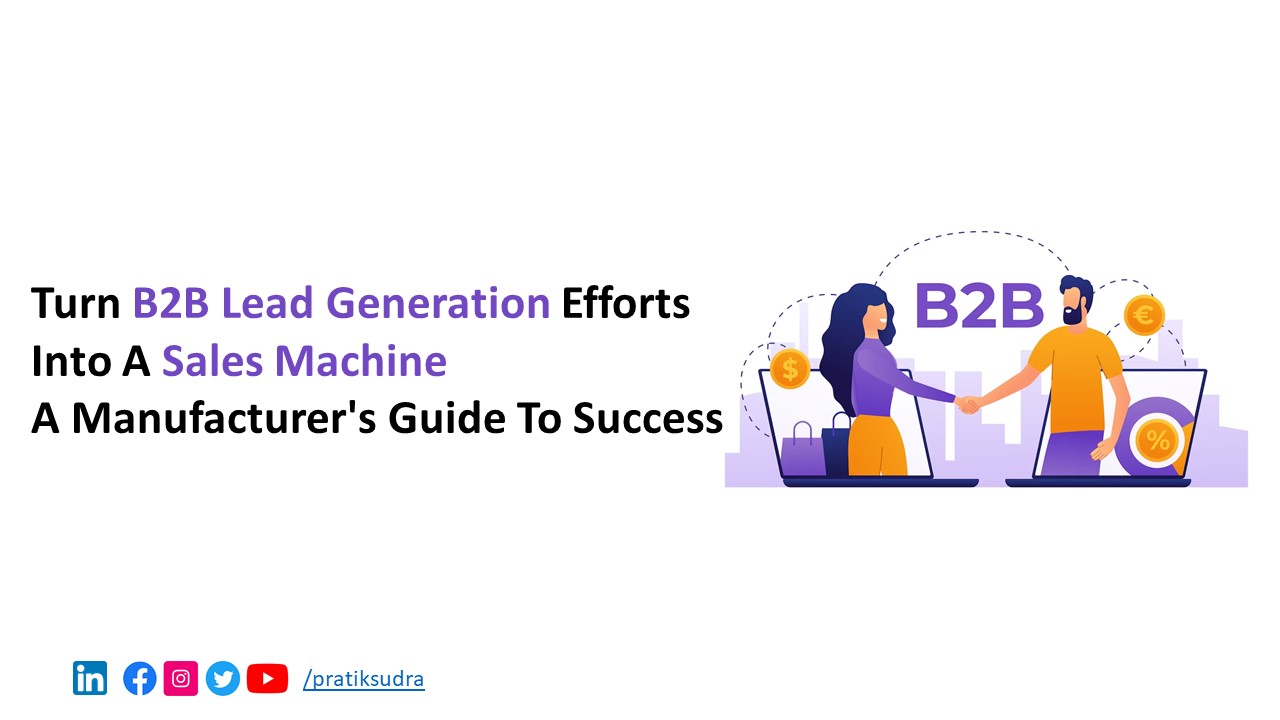Synopsis
The blog discusses effective strategies for B2B lead generation, specifically for manufacturers. By identifying the ideal customer profile, leveraging social media, offering valuable content, following up effectively, personalizing the approach, using paid advertising, optimizing the website, and using targeted landing pages, manufacturers can generate high-quality leads and convert them into loyal, long-term customers. The article emphasizes the importance of identifying the ideal customer profile, creating personalized messaging, and following up with leads in a timely and effective manner. Additionally, it stresses the significance of offering valuable content and using paid advertising and social media to reach potential customers. The blog concludes by highlighting the importance of creating targeted landing pages that are specific to each product or service, using clear and compelling headlines, engaging images or videos, and persuasive copy.
Table Of Content
- Introduction
- Identify the Ideal Customer Profile:
- Leverage Social Media:
- Offer Valuable Content:
- Follow Up Effectively:
- Personalize Your Approach:
- Use Paid Advertising
- Optimize Your Website:
- Use targeted landing pages:
- Conclusion
Introduction
B2B lead generation is an essential component for the growth and success of any manufacturing company. By effectively hunting, generating, and converting leads, a manufacturer can build a steady stream of potential customers that can turn into loyal, long-term customers. In this blog, we will discuss some effective strategies for improving the B2B lead hunting, generation, and conversion cycle for manufacturers.
Identify the Ideal Customer Profile:
The first step to generating high-quality B2B leads is to identify your ideal customer profile. By understanding your target audience's demographics, pain points, and purchasing behaviors, you can create targeted messaging and content that resonates with them. This will help you generate more qualified leads and increase the chances of converting them into paying customers.
Leverage Social Media:
Social media platforms like LinkedIn, Twitter, and Facebook can be powerful tools for B2B lead generation. By creating engaging content and participating in industry-specific groups, you can build relationships with potential customers and generate leads. Social media also provides an opportunity to advertise your products or services to a specific audience, increasing your chances of converting them into customers.
Offer Valuable Content:
Offering valuable content, such as blog posts, whitepapers, and case studies, is an effective way to attract potential customers and generate leads. By providing helpful information and insights, you establish yourself as a thought leader in your industry, building trust with potential customers. Use lead magnets, such as free trials or consultations, to capture contact information and nurture leads through the sales funnel.
Follow Up Effectively:
Following up with leads in a timely and effective manner is critical to converting them into customers. Use tools like email automation and customer relationship management (CRM) software to stay organized and ensure that you're reaching out to leads at the right time. Use personalized messaging to show potential customers that you understand their pain points and can provide solutions that meet their needs.
Personalize Your Approach:
Personalization is key to standing out in a crowded market. By tailoring your messaging and content to each lead's specific needs, you can build a stronger relationship and increase the likelihood of converting them into customers. Use tools like dynamic landing pages and personalized email campaigns to create a personalized experience for each lead.
Use Paid Advertising:
Paid advertising, such as Google Ads and LinkedIn Ads, can be an effective way to generate B2B leads. By targeting specific keywords and demographics, you can reach potential customers that are more likely to be interested in your products or services. Use targeted landing pages to capture contact information and nurture leads through the sales funnel.
Optimize Your Website:
Your website is often the first point of contact for potential customers. Ensure that it's user-friendly, easy to navigate, and provides relevant information about your products or services. Use targeted landing pages and CTAs strategically throughout your website to encourage visitors to take the next step in the sales process.
Use targeted landing pages:
Using targeted landing pages can increase the chances of converting visitors into leads. Create landing pages that are specific to each product or service you offer, and tailor your messaging and content to each audience. Use clear and compelling headlines, engaging images or videos, and persuasive copy to encourage visitors to take action. Also, ensure that your landing pages are optimized for mobile devices and load quickly to provide a seamless user experience. By using targeted landing pages, you can capture more qualified leads and increase the likelihood of converting them into paying customers.
Conclusion
In conclusion, B2B lead generation is critical to the success of any manufacturing company. By identifying the ideal customer profile, leveraging social media, offering valuable content, following up effectively, personalizing your approach, using paid advertising, and optimizing your website, you can improve your B2B lead hunting, generation, and conversion cycle. Implementing these strategies can help you generate high-quality leads and convert them into loyal, long-term customers, driving growth and success for your manufacturing company.


